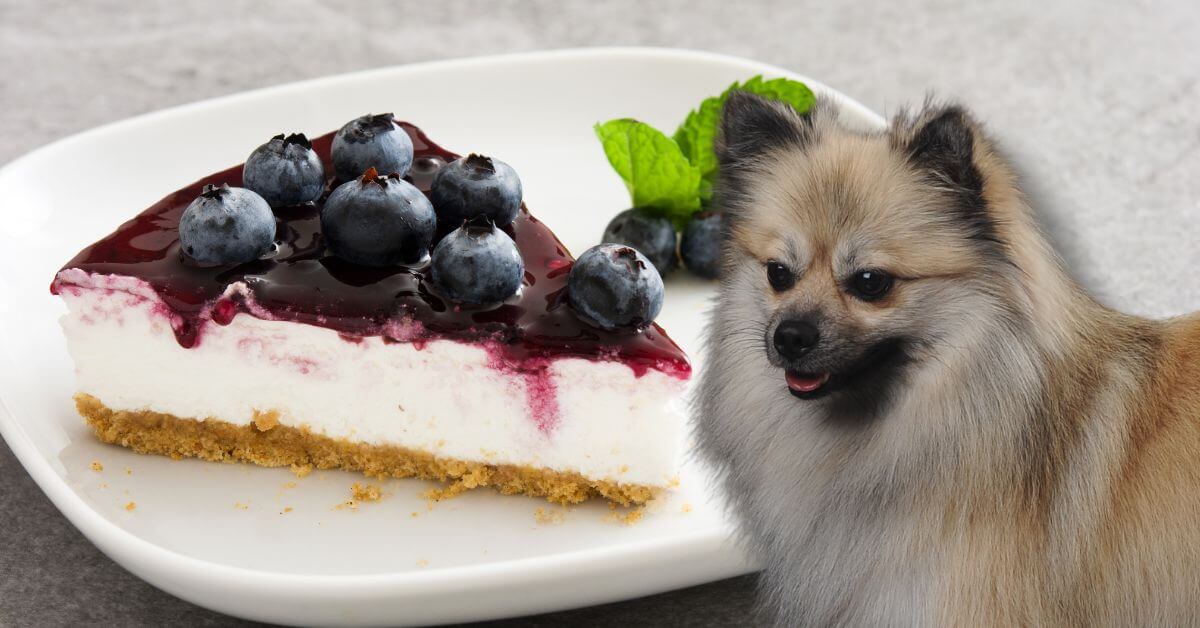Can Dogs Eat Cheesecake?
No, dogs should not eat cheesecake. If your dog accidentally eats cheesecake, there’s no need to panic. Cheesecake is not toxic to dogs, so they will be fine if your dog has a small piece. Nothing will happen. The main ingredients in traditional cheesecake, such as cream cheese, eggs, and sugar, aren’t toxic for dogs. However, it’s not a good practice to give them cheesecake regularly. When dogs eat lots of fat and sugar, they can experience digestive issues like diarrhea and upset stomach, and over time, that leads to more serious health problems like obesity and pancreatitis. So basically, you’re gonna make them fat and unhealthy!

Cheesecake is full of fat, sugar, raisins, and sometimes even chocolate — all of which are not healthiest foods. In this article, we’re gonna break this down into several sections to see why dogs can’t eat cheesecake.
Why cheesecake is not safe for dogs
- Sugar: Cheesecake is loaded with sugar, which isn’t good for dogs. Too much sugar causes obesity in dogs, just like in people. Obesity in dogs can cause a bunch of other health problems, like diabetes, heart disease, and joint issues. Sugar also affects dogs’ dental health. It feeds the bacteria in their mouths, causing plaque buildup, tooth decay, and gum disease. This can lead to painful teeth, infections, and even problems in other parts of the body, like the heart and kidneys. Plus, too much sugar can mess with a dog’s metabolism, leading to diabetes, which needs lifelong management and can really impact a dog’s quality of life.
- Fat: Cheesecake’s creamy texture comes from its high-fat content. Dogs’ digestive systems aren’t built to handle a lot of fat, and eating high-fat foods can potentially cause pancreatitis (inflammation of the pancreas). Pancreatitis is serious and can cause symptoms like severe belly pain, vomiting, diarrhea, loss of appetite, and tiredness. It’s often an emergency that needs a vet’s attention right away. High-fat diets also contribute to obesity, making the health risks of cheesecake even worse.
- Dairy products: Cheesecake is full of dairy products like cream cheese and sour cream, making it taste so delicious. But many dogs are lactose intolerant, meaning they can’t digest lactose, the sugar in milk. When dogs eat dairy, it can cause diarrhea, gas, bloating, and stomach upset. Even dogs that aren’t severely lactose intolerant can still have tummy troubles from dairy.
Why sugar-free cheesecake is bad for dogs?
Sugar-free cheesecakes might have artificial sweeteners like xylitol, which is highly poisonous to dogs. Xylitol is extremely dangerous to dogs because it causes a rapid and potent release of insulin from their pancreas. Unlike humans, where xylitol does not trigger insulin release, in dogs, it is quickly absorbed into the bloodstream. This sudden spike in insulin can cause a significant drop in blood sugar levels, known as hypoglycemia, within just 10 to 60 minutes of ingestion. If left untreated, this severe drop in blood sugar can be life-threatening, leading to symptoms like vomiting, loss of coordination, seizures, and even coma. It’s crucial to keep any products containing xylitol out of reach (that includes your garbage bin and trash!) and ensure their safety.
What other cheesecake ingredients are unsafe for dogs?
- Chocolate: Chocolate is one of the worst things for dogs. It contains theobromine and caffeine, both of which are toxic to dogs. Even a small piece of chocolate can cause vomiting, diarrhea, rapid breathing, increased heart rate, and seizures. In severe cases, it can be fatal. And since they have more real chocolate, dark chocolate and the one we use for baking are especially harmful because they contain higher levels of theobromine.
- Raisins and grapes: Raisins and grapes are extremely toxic to dogs. Even a small number can cause serious health problems, including sudden kidney failure. The first symptoms of raisin toxicity are vomiting, diarrhea, lethargy, and loss of appetite. If you think your dog ate raisins or grapes, you should contact your vet immediately and describe the symptoms.
- Alcohol: Some cheesecake recipes use alcohol for flavor, such as rum or liqueurs. Alcohol is very toxic to dogs and can cause symptoms like vomiting, diarrhea, difficulty breathing, tremors, and even coma or death.
- Vanilla extract: Vanilla extract and other flavoring extracts contain alcohol, which is bad for dogs. Even small amounts of alcohol can cause poisoning in dogs.
- Citrus: Some cheesecake recipes include citrus fruits or zest, like lemon or lime. Citrus fruits have citric acid and essential oils that can cause gastrointestinal upset in dogs. In large amounts, citrus can also affect the central nervous system.
If your dog eats a regular cheesecake, monitor them for any signs of digestive discomfort, but they should generally be fine. Always keep sugar-free versions out of reach, and consult a vet if your dog consumes any. While an occasional accidental nibble of regular cheesecake isn’t cause for alarm, it’s best to give them treats that are specifically made for dogs to ensure their health and well-being.
Love, life, and fur forever!
FAQs
Can dogs eat strawberry cheesecake?
While strawberry cheesecake is not toxic to dogs, giving it to them is not recommended. The dairy, sugar, and fat content can cause digestive issues and contribute to long-term health problems like obesity and pancreatitis. Additionally, the crust and any added ingredients could pose further risks. It’s best to stick to dog-friendly treats.
Can dogs eat pumpkin cheesecake?
Pumpkin cheesecake is also not toxic to dogs, but feeding it to them is not advisable. The high levels of sugar, fat, and dairy can upset your dog’s stomach and lead to more severe health issues over time. If you want to share pumpkin with your dog, plain cooked pumpkin without any additives is a much safer and healthier option.
Can dogs eat cheesecake crust?
Cheesecake crust is typically made from ingredients like graham crackers, sugar, and butter, which are not suitable for dogs. The crust can be high in sugar and fat.